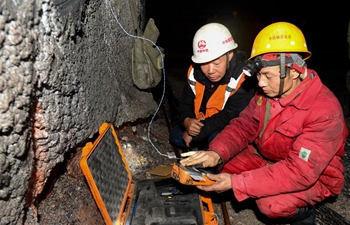LOS ANGELES, June 12 (Xinhua) -- The search for life on exoplanets -- planets outside our solar system -- will be boosted by a flower-shaped spacecraft helping a space telescope to see distant objects like never before, said NASA on Tuesday.
The light from a planet orbiting a star is about 10 billion times fainter than that from a star, making it very hard for a telescope to get direct imaging.
To cope with this challenge, engineers at the Jet Propulsion Laboratory (JPL) in Pasadena, California have designed a "starshade" technology to block starlight, NASA's Tuesday release showed.
A future starshade mission would need two spacecrafts to work hand-in-hand. One would be a space telescope on the hunt for exoplanets. The other would fly some 40,000 km in front of the telescope, carrying a large, flat shade, according to the JPL.
The shade would unfurl like a blooming flower with metalic "petals" and block the light from a star, allowing the telescope to get a clearer glimpse of any planet.
The process will only work if the two spacecrafts precisely align with one another, despite a vast distance in-between, according to the JPL.
"If the starshade were scaled down to the size of a drink coaster, the telescope would be the size of a pencil eraser and they'd be separated by about 60 miles (100 km)," said JPL engineer Michael Bottom.
Both spacecrafts will experience "little tugs and nudges from gravity and other forces, and over that distance we're trying to keep them both precisely aligned to within about 2 millimeters," he said.
Blocking out starlight is a key to performing more direct imaging and, eventually, to carrying out in-depth studies of planetary atmospheres or finding hints about the surface features of rocky worlds.
Such studies have the potential to reveal signs of life beyond Earth for the first time, said JPL.

















